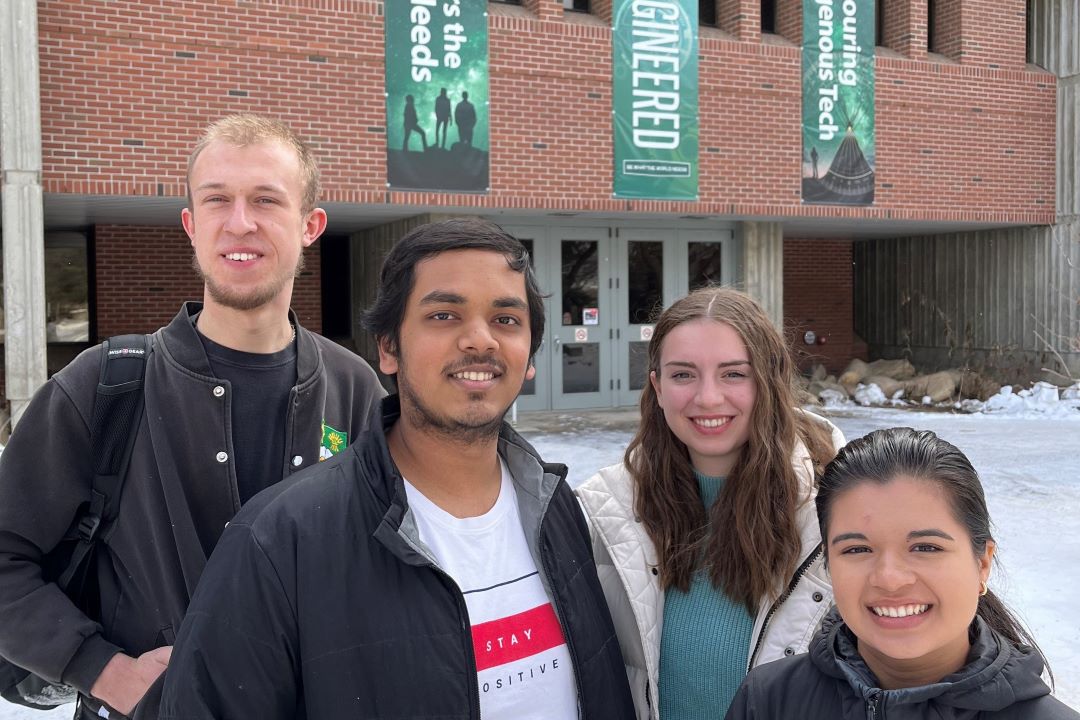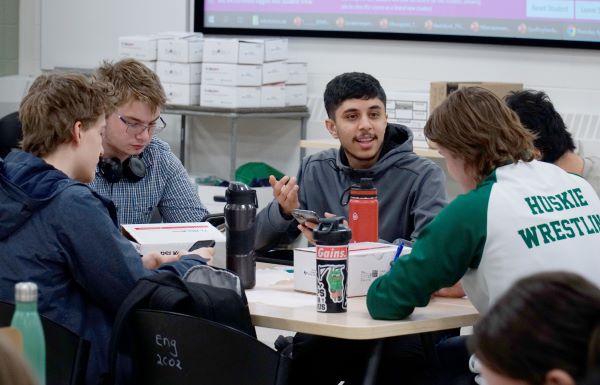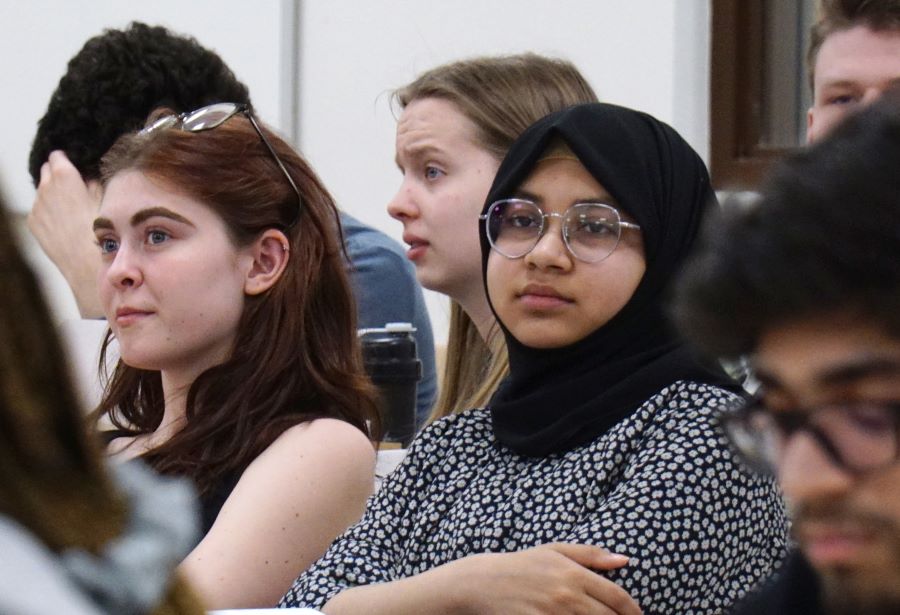
RE-ENGINEERED first-year program getting top marks
FROM THOROUGH MAGAZINE: USask Engineering students have positive feedback for the new program - and some suggestions for improvement.
By Colleen MacPhersonIt was a mammoth task for the University of Saskatchewan College of Engineering (USask Engineering) to totally revamp its first-year engineering program, particularly during a global pandemic, but more than a year after the introduction of its new curriculum, the college is getting very good grades for RE-ENGINEERED.
“We were under no illusions it would be perfect out of the gate,” said Dr. Joel Frey, an assistant professor jointly appointed to the Graham School of Professional Development (SOPD) in the college and the Department of Electrical and Computer Engineering and a lead member of the RE-ENGINEERED design team. “There’s no literature that will tell you how to do this.”
Starting in 2016 with a blank piece of paper, the designers created a unique, innovative first-year program focused on ensuring students acquire a diverse skill set that will carry them to graduation. For team lead Dr. Sean Maw, the first full year of the program “went better than expected. There were some challenges but perhaps fewer than we’d imagined.”
The team recently learned it had been awarded a 2023 D2L Innovation Award in Teaching and Learning presented by the Society for Teaching and Learning in Higher Education (STLHE) in recognition of innovative approaches that promote student-centred teaching and learning.
Maw, the Jerry G. Huff Chair in Innovative Teaching and a faculty member at the SOPD, believes most major hiccups have been resolved “so now we’re looking at fine-tuning and investing in continual improvement.”
To that end, Frey said the first-year instructional team is looking at adjusting student workload.
The new program moves away from traditional semester-long classes; courses vary in length and intensity, with particular attention paid to sequencing so a skill acquired in one course can immediately be applied in the next.
Feedback from students and instructors indicates the timing of classes can be improved, he said. “We want to make sure we save energy where we can, so we’ll look at moving courses and modules around to improve the timing of delivery.”
Using a competency-based assessment (CBA) approach to evaluate students’ grasp of skills and knowledge is among the more significant changes in RE-ENGINEERED. “All things being equal, it should be a better way of assessing students,” said Maw, “but in what ways and how long the effects last are still to be investigated.”
But CBA too has revealed a pressure point.
With CBA, students are tested on learning outcomes embedded in course content to ensure mastery before moving on. A key feature is that students receive feedback on their assignments and then get the chance to rewrite, or “top up,” to improve their mark.

“What we’ve found, though, is that CBA is really hard to do in compressed or accelerated courses,” Frey said. “We’re going to add a bit more duration to give students and instructors more time for assessment.”
Maw added that “CBA, by definition, is more work for instructors. More evaluations means just that – multiple evaluations and more grading. There’s also a scheduling challenge for instructors because of a lack of predictability of assessments; we have top ups for people who didn’t succeed the first time, but you don’t know how many (students) that will be.
“In CBA, success depends on co-ordination of content, delivery methods, workload and evaluations,” he said. “I believe CBA has given us the benefits we were hoping for, but we’ll continue gathering feedback on whether the tweaks and changes we’re making are improving things or not.”
Other key features of RE-ENGINEERED are online summer courses students take at their own pace before the start of the first term to fill gaps from their high school learning in subjects like math, chemistry and physics, and the grouping of students into blocks of about 50 students when they register for classes. This is done so there will be several groups with a consistent schedule and a common lunch break, creating opportunities for academic as well as social interactions.

Placing each student in a study squad of about a dozen people has also proved popular, providing students with built-in peer support for homework and giving them an opportunity to make friends.
The program design team was also aware of the need to pace student workload, something that didn’t always occur during the traditional first-year program. With ongoing communication amongst the team, instructors try to co-ordinate assessments so students do not end up with 10 assignments due one week and none the next.
Additional hallmarks of the new program include daily scheduled study sessions to get help from teaching assistants and an Indigenous cultural contextualization course taught in the first month of the program.
There is also a week set aside at the end of each term for GE112: Engineering Discipline Experience, a course allowing students to explore the range of engineering disciplines through information sessions and hands-on learning opportunities. For Frey, “this is the one thing I’m most proud of (because) we want students to make the best-informed decision they can.”
With adjustments being made and feedback being collected, RE-ENGINEERED will continue to improve, said Maw. “The challenge is to not lose track of the key philosophy and principles that got us here. This is an opportunity to make things better for students.”
What students say about RE-ENGINEERED
Discipline Experience
“I changed my mind from chemical to environmental engineering. I didn’t even know environmental was a thing but it will allow me to combine biology, chemistry and geology.” – Nicole Thompson, first-year student
“I was open to changing my mind but the presentations cemented my original choice.” – David Livingston, first-year student
“Did a total 180 from computer engineering and now I’m interested in chemical. The presentation really showed me what being a chemical engineer was all about.” – Travis Frick, first-year student
Study Squads
“It’s nice to be able to talk through problems. It’s what it will be like when we’re professional engineers.” – Anson Kappel, first-year student
“Having a group of people is so helpful, a network to toss ideas to, to minimize the time you’re all stuck at roadblocks.” – David Livingston, first-year student
“They can be very social but we got a lot done, and you can make a friend.” – Ashton Wiens, first-year student
Competency-based assessment (CBA)
“It think it actually increases the workload with more assignments and different types of assignments but the feedback was really helpful.” – Travis Frick, first-year student
“If you do poorly, you can always make up for that by trying again. That means there’s not as much stress.” – Birair Khalid, first-year student
“I appreciated the top-ups, the feedback and the chance to redo assignments. The feedback helps you learn and truly understand.” – Emily Riemer, first-year student
Challenges
“I took a lot of university classes in high school and thought they should be similar, but I didn’t realize it would be so intense. You can learn, and you have to learn, how to manage your time.” – Peyton Fredlund
“The pace of classes was hard to adjust to.” – Evan Dymond
“Don’t be afraid to ask for help. Go to the help sessions and take full advantage of them, even if you’re just doing assignments.” – Andrea Stickwood
Highlights
“The first-year program did a good job of introducing us to engineering design processes and strategies, helping us master those professional skills.” – Andrea Stickwood
“A highlight was being narrowed down into small groups of students who all have shared interests and support each other.” – Peyton Fredlund
“Definitely our study squad. I found a best friend.” – Harsh Sawant
Together we will support and inspire students to succeed. We invite you to join by supporting current and future students' needs at USask.

